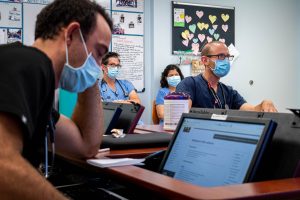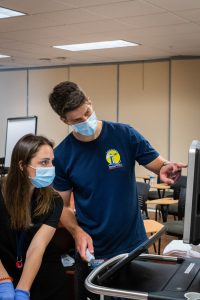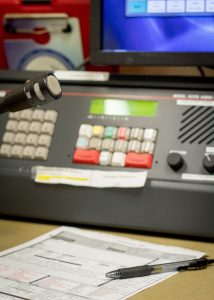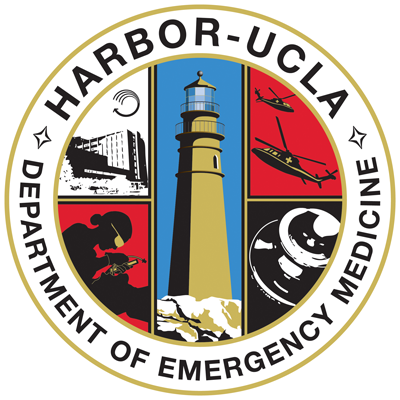Teaching Rounds

Teaching rounds are a treasured cornerstone unique to our program at Harbor-UCLA. Rounds are held six times daily in the Adult Emergency Department during the first and last hour of each shift. Yes, this means we have two hours of dedicated teaching each shift! Senior residents lead a session dedicated to discussing the management and disposition of every patient on your team in the ED. This provides an important moment to reassess the progress of patient care, learn from variations on practice style, and teach our learners valuable pearls regarding each case. Senior residents or faculty are then responsible for preparing a brief didactic session pertaining to an interesting case or EM topic. Rounds conclude with TeamSTEPPS, a multidisciplinary program with the nursing staff and pharmacy to foster collaboration among all ED staff and allow for improved patient care and hand-offs.
Didactic EM Conference
In addition to daily Teaching Rounds, didactic conferences are held Thursday mornings to cover core topics and new advances in Emergency Medicine. This 4-hour period is completely protected by our faculty, who cover all day shifts in the Emergency Department. In order to encourage our residents to establish habits of life-long learners, we also have 1 hour per week of self-directed learning through our monthly Asynchronous Assignments, curated by the Chiefs.
Core conferences cover a series of topics fundamental to practicing Emergency Medicine on a 36-month repeating basis, and are designed to cover the American Board of Emergency Medicine’s Model of Clinical Practice. We utilize the Foundations of EM curriculum as well as an adjunct to learning. Conference lectures and workshops are conducted by emergency medicine faculty, visiting faculty, and residents from all stages of training.
Triple Threat and Simulation Curriculum
Triple Threat Days are a resident favorite. Residents participate in multi-disciplinary learning that involves rotating in 3 small groups among a simulation session, workshop, or case based learning scenarios. These sessions provide an increased depth into each topic and often utilize engaging formats such as escape rooms and board games.
In addition, Harbor-UCLA continually makes a commitment to develop interactive and innovative simulations by utilizing our expansive Simulation Center. In addition to “Triple Threat Days,” simulation sessions are run periodically throughout conference days to reinforce effective teamwork, communication, and resuscitation of critically ill patients.
Off-Site Conferences
Living and training in sunny southern California does have its perks! Twice a year, outside of the off-site journal clubs, we take our learning outdoors. Whether it’s small group sessions at Hermosa Beach, a wilderness adventure at Hopkins Wilderness Park in Redondo Beach, or reviewing toxic plants at the South Bay Botanic Garden, there is always something new to learn!
Ultrasound Workshops

Conference-based ultrasound curriculum consists of a series of three workshops, taught and led by our renowned ultrasound faculty and fellows. These hands-on sessions review ultrasound basics (FAST, aorta, cardiac, gallbladder, renal) and advanced ultrasound techniques (venous access, orbital, procedural, nerve blocks, cardiac output, etc.). The curriculum is designed to supplement the substantial amount of ultrasound experience residents obtain in the emergency department. Additionally, residents complete two weeks of didactics and scanning shifts in their intern year with opportunities for an advanced ultrasound elective later in residency.
Journal Club
Journal Club is held every other month, both on-site at Harbor-UCLA and off-site at various attending homes or local beaches and parks. Three or four articles from the current literature are discussed in depth by junior residents (PGY-2) and faculty members. Our emphasis is on learning to critically read medical literature and highlighting various evidence-based practices and research methods in a relaxed and informal environment.
Morbidity and Mortality Cases
Morbidity and Mortality cases are presented by senior residents and focus on mortalities, near misses, and errors of management that occurred in the Emergency Department. Presentations are guided by a faculty mentor and emphasize an interactive discussion and evidence-based practice changes in a collegial, supportive environment.
EMS/Disaster Conference
In addition to being trained as a base station physician, taking medical command calls on shift, and direct report from ALS and BLS providers, residents participate in triannual “Pre-hospital Tape Review” sessions. Our EMS fellows and faculty guide us through recordings of pre-hospital paramedic runs that are educational. Furthermore, our entire department, as well as various other hospital departments, participate in the California Statewide Medical and Health Exercise each fall for disaster preparedness which takes place during our didactic conference. Residents can also train with the Hospital Emergency Response Training (HERT) for Mass Casualty Incident team at their training facility in Los Angeles, CA, at one of the annual training sessions.
Wellness Curriculum Series
A curated series of sessions every other month, created and designed for residents by residents as part of the resident-based EM Wellbeing Planning Committee. Sessions are designed to assist residents with finding balance, discussing burnout, and growing into the physicians and humans we aspire to be.
Combined Specialty Conferences
Joint Cardiology: Quarterly conferences are held with the Division of Cardiology to discuss emergency cardiology diagnoses and treatments including STEMIs, arrhythmias, and CHF.
Joint Pediatric: Three times a year, conferences are held with the Department of Pediatrics to discuss common pediatric emergencies, treatments, and emerging topics.
Joint Trauma: Monthly conferences are held with the Trauma Surgery service to discuss trauma patient management and emerging topics.
“All LA” Conference: Three times per year, the greater Los Angeles Emergency Medicine programs (Harbor-UCLA, LAC-USC, UCLA-Olive View, UC Irvine, and Loma Linda) attend a joint conference. The purpose of these conferences is to discuss cutting edge Emergency Medicine topics, participate in discussions led by the EM leaders from each institution, and enhance collegial relationships within Los Angeles.
Additional Educational Activities
Base Station Training

With a rich history in prehospital medical care, it should come as no surprise that Harbor-UCLA continues to serve Los Angeles county as a base station for on-line medical direction to prehospital providers. During base station training, our second year residents are taught to communicate with EMS personnel and review the rules and regulations for giving medical command. Training involves both didactic and hands-on internship under the direction of one of our Mobile Intensive Care Nurses (MICNs) before certification.
Career Development Curriculum
Senior residents are excused from the department for an annual R4 retreat to discuss topics such as job searches, contract negotiation, malpractice insurance, medico-legal issues and financial planning.
Oral Board Review
During each academic year, senior residents are divided by class to participate in “mock” oral boards. Mock oral boards take place after conference, in a simulated environment, with experienced faculty and alumni to guide you through the process.
Scholarly Activity Project
Each resident is required to produce a scholarly project suitable for publication in a peer-reviewed journal or text in emergency medicine. This may be a research project, literature review, retrospective study, case report, curriculum development, or book chapter.
Certifications
Basic & Advanced Cardiovascular Life Support (BLS/ACLS) – All residents are required to maintain their certification, with classes provided at Harbor-UCLA.
Advanced Trauma Life Support (ATLS) & Pediatric Advanced Life Support (PALS) – Junior residents in the second year are excused from the department for a class orientation, which includes both ATLS and PALS.
Neonatal Resuscitation Program (NRP) – Senior residents in the third year are excused from the department for a class retreat and certification in neonatal resuscitation.
